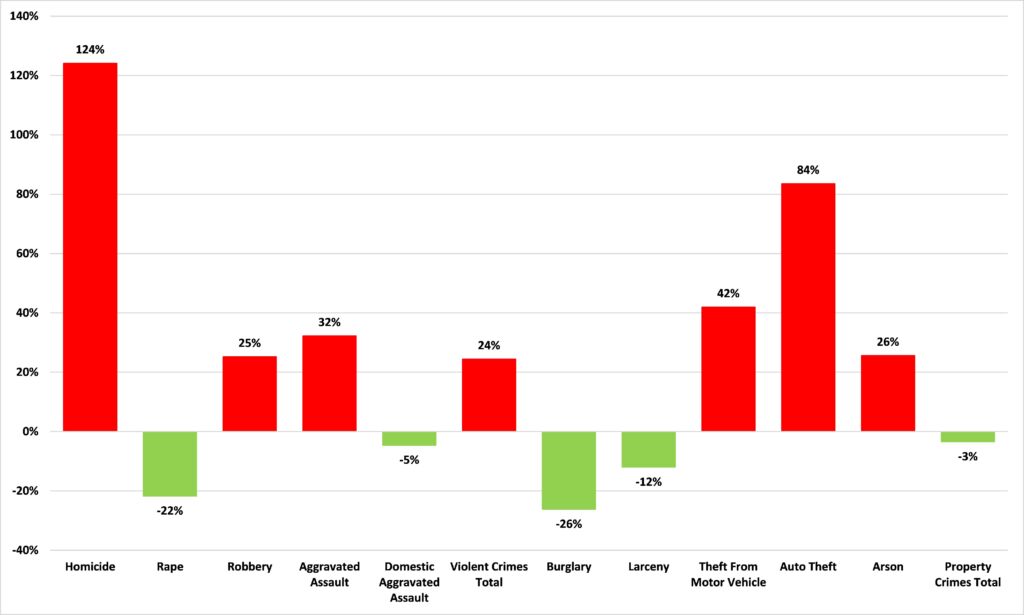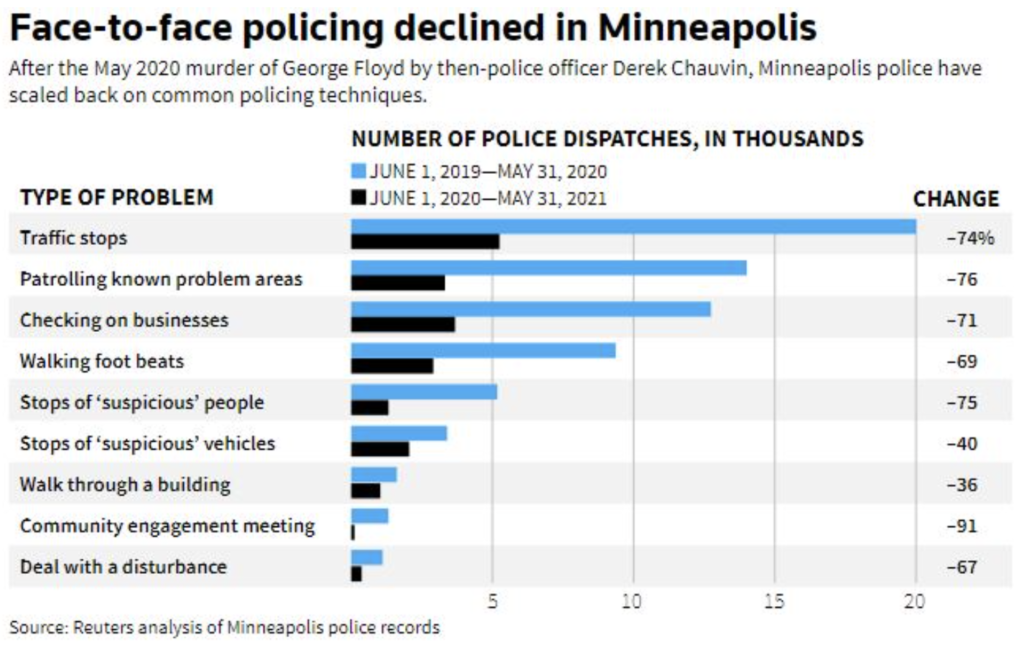Minneapolis cops are only doing what ‘progressives’ like Ilhan Omar want
Violent crime is exploding in Minneapolis.
Figure 1 shows the percentage change in a range of crimes in Minneapolis for the period Jan. 1, 2021, to Oct. 25, 2021, compared to an average of the same period for the years 2015 to 2019 (2020 was well above average in some of these categories, especially arson). It shows that, so far this year, burglary and larceny, which account for the large majority of property crimes, are both down on the 2015-2019 average so that, overall, property crimes are down.
It is a different story for violent crimes. Rape and domestic aggravated assault are both down so far in 2021 on their average for the same period for 2015-2019, but in that period, they accounted for only 30 percent of violent crimes. In each of the other categories of violent crime, Minneapolis is doing worse in 2021. Robbery is up 25 percent this year over the average for the same period in 2015-2019, aggravated assault is up 32 percent, and homicide is up by a staggering 124 percent.
Figure 1: Change in crime in Minneapolis, January 1, 2021-October 25, 2021, compared to average of same period for 2015-2019

Source: City of Minneapolis
What is behind this? There is a strong evidence that this increase in crime is, in large part, a result of a decline in the quantity of policing in Minneapolis. As Reuters reported recently:
Minneapolis’ police officers imposed abrupt changes of their own, adopting what amounts to a hands-off approach to everyday lawbreaking in a city where killings have surged to a level not seen in decades.
Almost immediately after Floyd’s death, Reuters found, police officers all but stopped making traffic stops. They approached fewer people they considered suspicious and noticed fewer people who were intoxicated, fighting or involved with drugs, records show. Some in the city, including police officers themselves, say the men and women in blue stepped back after Floyd’s death for fear that any encounter could become the next flashpoint.
“There isn’t a huge appetite for aggressive police work out there, and the risk/reward, certainly, we’re there and we’re sworn to protect and serve, but you also have to protect yourself and your family,” said Scott Gerlicher, a Minneapolis police commander who retired this year. “Nobody in the job or working on the job can blame those officers for being less aggressive.”
In the year after Floyd’s death on May 25, 2020, the number of people approached on the street by officers who considered them suspicious dropped by 76%, Reuters found after analyzing more than 2.2 million police dispatches in the city. Officers stopped 85% fewer cars for traffic violations. As they stopped fewer people, they found and seized fewer illegal guns.
…
To measure the change in policing, Reuters examined millions of dispatch and crime records from the city’s police force that track how officers spend their time. The pattern was stark: Within days of Floyd’s death, the number of stops and other encounters initiated by city patrolmen plunged to their lowest point in years.
Elder, the police spokesman, said the change should be unsurprising at a time when the department was overwhelmed by rioting.
But records show the pullback continued long after the unrest ended. In May, the most recent month for which complete records were available, officers initiated about 58% fewer encounters than they did in the same month the year before.
The number of traffic stops they conducted was down 85% over the same period. Business checks — in which officers stop at a business to talk to employees and customers — were down 76%. The number of people the police stopped for acting suspiciously also dropped 76%.
Fewer stops led to fewer people being searched for guns or drugs. The month before Floyd was killed, police made 90 drug arrests, police records show. A year later, they made 28. The number of people charged with breaking gun laws dropped by more than half, even as shootings multiplied.

With the decline in policing leading to an increase in violence, ‘progressives’ are now attacking the police. This weekend, the Star Tribune reports:
U.S. Rep. Ilhan Omar told constituents Saturday at a town hall meeting that Minneapolis’ rise in gun violence and carjackings can be blamed on police who “have chosen to not fulfill their oath of office and provide the public safety they owe to the citizens.”
But “here’s the deal”: by holding off stops and searches, the Minneapolis police are only doing what it is that ‘progressives’ like Ilhan Omar wanted them to do.
As I’ve noted before, on Sept. 8, Ramsey County Attorney John Choi announced a new “charging policy regarding non-public-safety traffic stops,” under which his office will not charge crimes stemming from a traffic stop of a vehicle for “non-public-safety reasons.” The policy means the Ramsey County Attorney’s office will no longer prosecute felony cases where the driver was initially pulled over for a minor traffic violation. The Star Tribune‘s editorial board cooed over this:
It’s a smart, fair move that’s been a long time coming.It will reduce the number of Black people and other people of color being disproportionately stopped over minor vehicle equipment violations. Both Philando Castile in 2016 and Daunte Wright earlier this year were pulled over for minor vehicle equipment violations and ended up dead at the hands of police.
It is also, as we’ve seen, a move which research shows is likely to lead to more people carrying guns and more gun violence.
Minneapolis cops are only doing what ‘progressives’ like Ilhan Omar, John Choi, and the editorial board of the Star Tribune want them to do. If you wanted the cops to stop stopping people, you can’t then blame the cops for the consequences when they do exactly that. It is sheer hypocrisy for any of them, now, to blame the cops for the results.